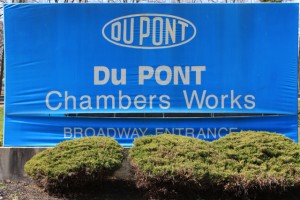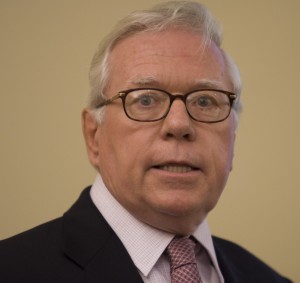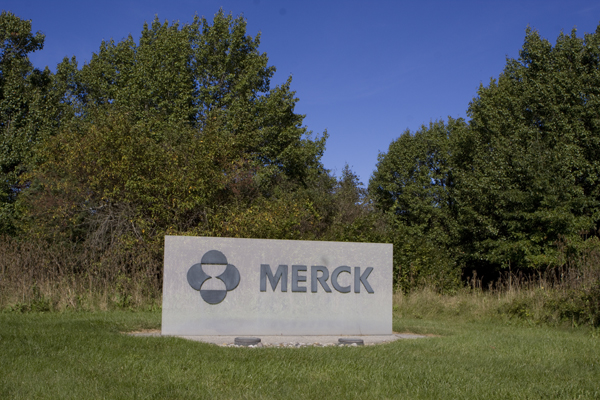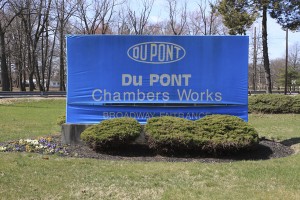Dupont: Doubt (And Intimidation) Are Their Product
Dupont Lawyers Target DEP Scientists – While Paid Dupont Consultants “Manufacture Doubt”
We have been writing about behind the scenes efforts of politically powerful polluters to exert improper influence on DEP scientists. We have called this the War on Science.

Dupont Chambers Works plant in Deepwater NJ is one of the worlds largest polluters. The plant manufactures PFOA & polluted groundwater with PFOA
Today we focus on the ugly tactics of Dupont.
But, first we put Dupont’s moves in context, and then present the game plan Dupont is following, via review of a superb new book by a scientific expert in the field.
We have documented an extremely troubling recent series of events that illustrate this war:
- DEP’s Chief Nuclear Engineer was demoted and transferred out of the nuclear safety program in retaliation for private remarks he made that questioned the nuclear industry’s influence on the Nuclear Regulatory Commission during the relicensing hearings on the Oyster Creek plant, one of the nation’s oldest and riskiest plants;
- A PFOA health risk assessment paper prepared by DEP scientists was pulled from submission for publication under orders from then DEP Commissioner Jackson;
- DEP Commissioner Jackson abolished the Division of Science and Research and used a bogus pretext to create a new external and potentially industry controlled Science Advisory Board. This move destroyed the independence of DEP science and a more than 20 years old effective scientific review process at DEP;
- The former Division of Science and Research Director, a woman with a PhD and 15 years of experience, was transferred to an administrative job in retaliation for defending scientific integrity;
- DEP issued a gag order in retaliation for DEP scientists’ release of a controversial Jersey City chromium health risk assessment. The new risk assessment concluded that chromium is a carcinogen and that current DEP standards are more than 200 times laxer than these new findings indicate are needed to protect public health. The gag order authorized DEP managers to hold completed scientific work in un-releasable draft form for an indefinite period; to restrict public disclosure under OPRA; and for intervention by political and DEP press office by allowing non scientists to conduct prepublication reviews of any controversial scientific reports;
- We disclosed documents that revealed that DEP scientists had to run a political gauntlet to publish a risk assessment on a chemical that has spread to contaminate drinking water. The controversy concerned perfluorooctanoic acid (PFOA), a toxic chemical manufactured by a NJ giant Dupont, used in nonstick cookware and stain resistant fabrics, such as Scotchguard.Those documents showed that DuPont was urgently pressing DEP regulators to lower a potentially multi-billion dollar clean-up liability for polluting groundwater.
- In a hostile move, lawyers representing DuPont filed several OPRA requests that personally targeted and intimidated the DEP scientists conducting the PFOA research.
- Dupont was granted a highly unusual opportunity: on August 7, 2009,Dr. Robert Tardiff of the Sapphire Group, which is advising DuPont, presented his PFOA risk assessment to members of the NJ Drinking Water Quality Institute. That same week, Tardiff privately met behind closed doors with DEP scientists and regulators;
- Facing a lawsuit, DEP was forced to released documents outlining how a health study of air pollution in Camden neighborhoods was re-written to allay industry objections. The released e-mails depict a clubby, closed door climate in which the state regulators seek to assuage industry concerns even while keeping the affected community in the dark;
- An audit by the U.S. Environmental Protection Agency faulted the quality and consistency of New Jersey science, quality assurance/quality control (QA/QC) and technical programs for cleaning up toxic wastes, preserving wetlands and other key functions.
Scientific tactics in this war are laid out in detail in a wonderful new book by science professor David Michaels titled Doubt is their Product –How Industry’s Assault on Science Threatens Your Health. Michaels is a professor at George Washington University, former Assistant Secretary for Environmental Safety and Health at the Department of Energy; and is now candidate for Administrator of the US Occupational Safety and Health Administration (OSHA).
Michaels exhaustively documents how industry, starting with the tobacco, lead, and asbestos industries, whose tactics were embraced by the chemical industry – has “manufactured doubt” to frustrate regulation, and as a result, killed and poisoned thousands of Americans. Using outright lies, denial, PR and then shifting to sophisticated “sound science”, industry is literally killing us.

Dr. Tardiff's August 7, 2009 presentation of to the NJ Drinking Water Quality Institute scientists. Tardiff presented his own PFOA risk assessment to challenge the DEP risk assessment findings.
In my favorite chapter, The Enronization of Science, Michaels describes step by step exactly how a “classic uncertainty campaign” is conducted. I’ve seen it all at work here in NJ:
- paid industry scientist attack government regulation and conduct dubious research to manufacture doubt and uncertainty in order to delay and forego regulation;
- public relations groups mount PR and media campaigns to spin this science and mislead the American public;
- highly paid legions of lawyers (“the products defense industry”) are called into action to litigate and intervene to frustrate regulation;
- consulting firms, industry front groups, trade associations, and think tanks are formed to promote the industry’s economic interests and create an echo chamber for bogus scientific claims;
- Lobbyists work Congress and the Whitehouse to pressure regulators and thwart regulation
Michaels concludes with an urgent warning and appeal to scientists to wake up to what is going on and speak out to the American public:
Industry has learned that debating the science is much easier and more effective than debating the policy. Take global warming for example. The vast majority of climate scientists believe that there is adequate evidence of global warming to justify immediate intervention to reduce the human contribution. They understand that waiting for absolute certainty is far riskier and potentially far more expensive – than acting responsibly now to control the causes of climate change. Opponents of action, led by the fossil fuels industry, delayed this policy debate by challenging the science with a classic uncertainty campaign. I need only cite a cynical memo that Republican political consultant Frank Luntz delivered to his clients in early 2003. In “Winning the Global Warming Debate”, Luntz wrote the following:
“Voters believe that there is no consensus about global warming within the scientific community. Should the public come to believe that the scientific issues are settled, their views about global warming will change accordingly. Therefore, you need to continue to make the lack of scientific certainty a primary issue in the debate. The scientific debate is closing [against us] but not yet closed. There is still a window of opportunity to challenge the science (emphasis in original)….]
Polluters and manufacturers of dangerous products tout “sound science”, but what they are promoting just sounds like science but isn’t. Only the truly naive (if there are any of these folks left) will be surprised to learn that the sound science movement was the brainchild of Big Tobacco. George Orwell has given us a word fr such rhetoric. The vilification of any research that might threaten corporate interests as “junk science” and the sanctification of its own bought and paid for research as “sound science” is indeed Orwellian.
The scientific enterprise is at a crossroads. We need to understand what is going on in the name of “sound science” and what the consequences may be and already have been for public health. At its heart, this book is about the way in which product defense consultants have shaped and skewed the scientific literature, manufactured and magnified scientific uncertainty, an influenced policy decisions to the advantage of polluters. (emphases supplied)
In addition to the ugly attacks on DEP scientists by Dupont lawyers mentioned above, Dupont is engaged in a classic uncertainty campaign and war on science that so concerns professor Michaels.
I attended Dupont consultant Dr. Tardiffâs August 7, 2009 presentation of to the NJ Drinking Water Quality Institute scientists. Tardiff presented his own PFOA risk assessment to challenge the DEP risk assessment findings. Tardiff followed classic “manufacture doubt” tactics by challenging the validity of the animal studies that show that PFOA is a human carcinogen. Yet despite this over the top attack, not one DWQI scientist publicly challenged Tardiff’s misleading and radical conclusions. Clearly, they were intimidated and reluctant to call Tardiff out.
A single one of the above actions would be a problem.
Taken together they are deeply disturbing.
We’ll keep you posted.
In our next post, we will name names of industry scientists – including Dupont employees – that the chemical industry is pushing to control the new DEP Science Advisory Board.

 Since then, we received additional leaked DEP documents and emails which show that the
Since then, we received additional leaked DEP documents and emails which show that the